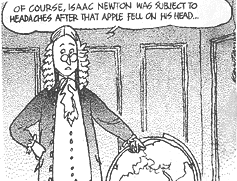
 |
Despite learning no useful physics at all as a student in the
early 1980s,I did pick up some top tips about the scientific process which
I remember to this day.And chief among these is to be wary of getting the
right answer by the wrong means. I still cringe at how I succeeded in convincing
my room-mate and fellow physicist to go along with some quite specious
explanation of an experimental result by my constant refrain of "Well,it
gives the right answer,doesn't it?"
As it turned out,not only was my explanation the purest twaddle,but
so was the "answer" it was supposed to account for. The experience did at
least teach me that while bogus explanations often reveal themselves by failing
to match reality, they don't always: sometimes they can do a worryingly
convincing imitation of the genuine article.And such specious success can
go unchallenged for years.
Take the attempts of astronomers to understand
the Moon's orbit around the Earth.Reputedly the
only problem that ever made
Isaac Newton's head
ache,Lunar Theory is notoriously complex,with a host of subtle effects demanding
explanation.One such emerged in 1749,when Richard Dunthorne of Cambridge
University reported that ancient accounts of eclipses pointed to a gradual
speeding up of the Moon in its orbit.The acceleration was extremely small
- a speed increase of about 0.00001 mph over a century - yet is explanation
posed a major challenge.
In 1786,the brilliant French astronomer
Pierre de Laplace announced that
he had found the cause : the pull of the other planets on the Earth.This
changed the orbit of the Earth around the Sun,thus altering the Sun's influence
on the Moon - which duly accelerated. Laplace estimated the
acceleration,obtaining a figure very close to that found by Dunthorne.Everyone
cheered,and went home.
And so matters stood for the next 60 years,until the Cambridge
mathematician John Couch Adams looked again at the problem,and found Laplace's
theory could explain barely half the troublesome acceleration.Academic uproar
followed,with some astronomers insisting that the old explanation must be
right,because it "gave the right answer". We no know that both the figure
and the acceleration and Laplace's explanation of it are wrong (the actual
cause lies in the effect of the tides),but for years no one seriously questioned
either.
For the past few months,a similar controversy has been running
in the pages of Physics World over a more down-to-Earth matter; whether wearing
a magnetic bracelet offers any health benefits.Many scientists would simply
scoff at the idea,but it takes a physicist to come up with a natty demonstration
that such bracelets are,at best,placebos. In the January issue of the
magazine,Robert Park,of the University of Maryland,highlighted the feeble
nature of the magnets involved by pointing out that just a few sheets of
paper slid under them was enough to stop them sticking to a fridge
door.How,then,might they be expected to penetrate the much thicker layers
of the skin?
The following month,however,a reader wrote to Physics World
pointing out that this was the right demonstration of the wrong phenomenon.All
Park's experiment proved was that a few sheets of paper were enough to cut
the magnetic field to levels where the magnet could not support its own
weight.But,the reader asked,so what? perhaps much weaker fields could still
bring health benefits. A likely story,one might think.Yet a letter in this
month's Physics World moves the debate on still further.Two researchers from
the University of Zaragoza, Spain,cite experimental evidence that modest
magnetic fields do indeed affect living creatures.Indeed,they suggest red
blood cells can be affected by relatively feeble magnetic fields,producing
changes in blood flow and skin temperature.
So it now seems tat not only was Park's debunking" experiment
ill-conceived,but that the "right answer" it was designed to demonstrate
- that weak magnetic fields cannot bring health benefits - may also be wrong.
Until a natty debunking experiment does emerge,I suppose I should take the
many personal testimonies I've heard on the efficacy of these bracelets at
face value.But I can't help but recall another scientific top tip I learned
some years ago: that the plural of "anecdote" is not "data".
Robert
Matthews
| Chaos | Quantum | Logic | Cosmos | Conscious | Belief | Elect. | Art | Chem. | Maths |
Sunday Telegraph 12 Mar2000 File Info: Created Updated 24/4/2001 Page Address: http://www.fortunecity.com/emachines/e11/86/rightans.html